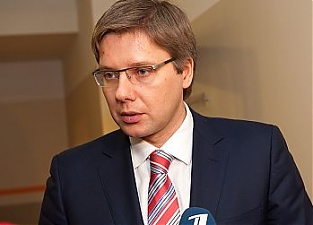Analytics, Baltic States – CIS, Latvia, Legislation, USA
International Internet Magazine. Baltic States news & analytics
Saturday, 20.04.2024, 07:07
New York Times does story on Riga Mayor Nils Usakovs
 Print version
Print version |
|---|
The magazine delves into Usakovs' personal life and career climb, and explains the reality of Latvia's Russian community.
The New York Times indicates that the future goal of the Usakovs-led party – Harmony, is to attract a significant number of ethnic Latvian voters.
"We don't talk about ethnic issues. I believe that, in the long run, politics in our city and our country needs to be based on ideological values, not ethnicity," Usakovs said.
While the majority of Harmony's voters are still ethnic Russians, he said, the number of its Latvian supporters has been growing. In this year's elections, the party won 20% of its support from Latvians, he said.
The newspaper points out that there is limited open conflict in everyday life between Latvians and Russians, leading some to wonder whether it is the political class that is keeping the gap from closing.
"We are going through a complete transformation in a country that is multilinguistic and multiethnic with debate about very serious issues from Latvia's history. It is complicated," Usakovs said.
Latvia’s population is about 61% Latvian and 26% Russian, with a small scattering of Poles, Ukrainians, Belarussians and others. Ethnic Russians, even those born in Latvia, like Mr. Usakovs, were not automatically made citizens when the country became independent of Russiain 1989. Today, about 300,000 ethnic Russians living in Latvia are still not citizens, including Mr. Usakovs’s mother.
Mr. Usakovs’s Russian-born parents were brought to Latvia as children shortly after World War II, part of a migration of Russians into regions that had been absorbed into the Soviet Union.
He was raised speaking Russian, and his elementary schooling was in Russian. Not until he was 16 did he learn to speak Latvian, he said, partly so he could take classes at the University of Latvia, where he majored in analytical economics.
In 1999, when he graduated from college, Mr. Usakovs went through the naturalization process, which involves passing a test on Latvian history, demonstrating a proficiency in the Latvian language and taking an oath of allegiance to the country.
Fast on his feet and deeply interested in social policy issues, he took a job as a producer for the Baltic division of the Russian television channel NTV, then moved to Latvian Public Television before becoming an editor at two Riga newspapers, the host of his own weekly television program and, finally, the editor at the First Baltic Channel for the evening news in Lithuania and Estonia.
But the deeper he got into political reporting, the more persistent was the itch to become a politician.
When the leaders of the struggling Harmony Center, stuck in seemingly permanent minority status, asked the telegenic young Russian — so unlike the aged and dour leaders the party had before — to assume control in 2005, he jumped at it.
“If you believe some things are being done wrong, what do you do?” he asked. “You can stay in journalism and try to address them through education, or you go into politics.”
HE makes no secret of his desire for higher, national office, something that would be quite difficult if his party remained rooted in its Russian-ethnic base. It is not an easy path for him. He can, and has, spoken in favor of maintaining Ukraine’s territorial integrity, a move that he believes cost him some votes among his hard-core base. But he also came out strongly against Western sanctions on Russia over the conflict.
“We are not alone,” Mr. Usakovs said. “We are among the Europeans who believe that sanctions will not work. And we are rational. We believe it is beneficial for us to have good relations with Russia.”
Whether he can find a way to satisfy his base, many of whom are fiercely pro-Russian, while attracting enough Latvians to the party, is the key to his future.
Ethnic integration is still “too big a divide” in Latvia, said Douglas Wake, an American former diplomat who was a visiting fellow at the Latvian Institute of International Affairs. There is still “not enough sense that everybody feels there is a Latvian state one can feel good about, offering allegiance without any ethnic characteristics whatsoever,” he said during a presentation at the institute last month.
Still, there is very little open conflict in everyday life between Latvian speakers and Russian speakers, leading some to wonder whether it is the political class that is keeping the divide from closing.








 «The Baltic Course» Is Sold and Stays in Business!
«The Baltic Course» Is Sold and Stays in Business!

